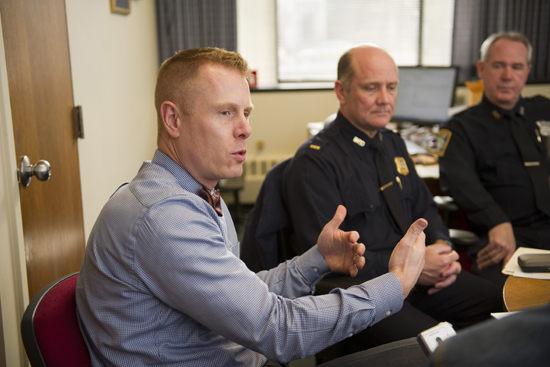New Alcohol Enforcement Effort to Continue
Still too many hospital runs, but quieter weekends applauded

David McBride (left), director of Student Health Services, discusses alcohol enforcement with police officials. Photos by Cydney Scott
BU’s fall crackdown on alcohol abuse has gotten raves from residents of neighborhoods that have seen raucous partying decline as the semester unfurled. But too many dangerously drunk students—eight on average—were still rushed to the hospital on weekends, say medical officials and University, Boston, and Brookline police.
The bottom line? Continued enforcement in the spring semester, albeit with fewer officers, according to the cops.
BU’s initiative, combining beefed-up enforcement with weekly publication of statistics on numbers of hospital transports, citations, busted parties, and the like, was based on a similar enforcement plan developed at the University of California. UC reported reduced numbers of students getting drunk off campus due to the enforcement.
Asked if he’d pronounce the enforcement experiment a success, David McBride, director of Student Health Services, says, “I would say that enforcement historically has been one of BU’s strongest and most effective interventions in addressing this problem. I think we have a lot more work to do in prevention. As a gestalt, I would say I’m pleased with the outcome.” For now, McBride plans to gather data tracking any changes in student drinking behavior as the year progresses. Some of the collection is part of BU’s participation in the Learning Collaborative on High-Risk Drinking, a collaboration of colleges trying to curtail binge drinking. He is also pondering more effective communication with students about alcohol before they arrive on campus next September.
Enforcement alone won’t markedly drive down transport numbers, says McBride, “but I think if we decrease the likelihood that people are going to be throwing big keg parties with buckets full of jungle juice…maybe down the road, those dangerous transports will go down.” Along those lines, Boston police prosecuted more than 100 students and others this fall for illegally procuring or supplying alcohol, “much more than we did last year,” says Capt. James Hussey of the Boston PD. The collaborating police departments also broke up 40 parties during the 10 weekends of the enforcement, some with up to 200 attendees.
Brookline Police Lt. Philip Harrington says there was praise for the police efforts at an October community meeting in that town. “The complaints aren’t so much of the parties as the street noise,” he says, “so most of our focus this year was really dealing with the kids coming out on the street” and citing them for nuisance violations.
“We are not coming to an end” of the enforcement, Hussey vows. “We will continue to be vigilant out there through the rest of this semester, and when the next semester starts, we will be back out into…Brighton and Allston. We will continue to monitor those areas, seeking those people who are drinking underage and those people having parties and providing alcohol for minors.” As the school year launched, the enforcement plan hit hard to set a tone, he says, in hopes of encouraging the typical mellowing of student partying later in the year, when young drinkers have learned their tolerance and cold weather keeps the windows closed on parties.
Strong enforcement, ironically, may have contributed to the large numbers of hospital transports as police rounded up more drunk students, says McBride. Those students are sometimes “alarmingly intoxicated,” he says.
Armstrong Ambulance EMT Natalie Finn, who has attended drunken students, says their behavior “might not indicate how drunk they actually are,” but their blood alcohol content can be two or three times the legal limit. In most cases, she says, “these kids are under 21,” the legal drinking age in Massachusetts.
“They can be pleasant, talkative, and just all of a sudden they vomit everywhere, they don’t know where they are,” Finn says. “From the party environment to the hospital…they do change rather quickly.”
The 2010–2011 academic year saw 250 students taken to the hospital for acute intoxication, and this year may roughly replicate that, says Capt. Robert Molloy of the BU Police Department. Authorities ran 81 hospital trips for intoxicated students in the 10 weekends from September 9 to 11 through November 10 to 13. On the plus side, Molloy says, “the amount of activity in the West Campus area and the South Campus area, with kids carrying alcohol and walking into the dorms with alcohol—we’ve seen less of that as we get later into the semester. In September, it was pretty bad.”
The crackdown and weekly publication of its results on BU Today prompted online outrage from some students, with many saying the University was wasting money interfering with their lives. “Is this where the $50,000 goes that I watch my parents struggle to pay every year?” groused one. McBride terms that type of response “expected.” But it wasn’t just residents near the University who were thankful for more peace in their neighborhoods—Molloy notes that some parents commented online about their appreciation for the enforcement.
Indeed, some of the lowest alcohol abuse of the semester was reported on Parents Weekend.

Comments & Discussion
Boston University moderates comments to facilitate an informed, substantive, civil conversation. Abusive, profane, self-promotional, misleading, incoherent or off-topic comments will be rejected. Moderators are staffed during regular business hours (EST) and can only accept comments written in English. Statistics or facts must include a citation or a link to the citation.